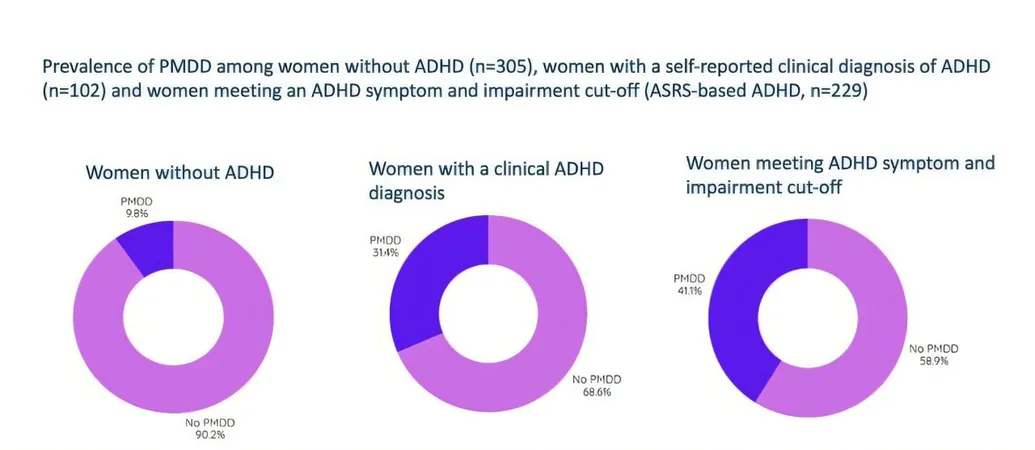
Unveiling the Disturbing Link Between ADHD and Severe PMDD in Women
2025-06-23
Author: Rajesh
New Study Reveals Alarming Connection
A groundbreaking study from Queen Mary University of London has revealed that women with Attention-Deficit Hyperactivity Disorder (ADHD) face a significantly heightened risk of developing Premenstrual Dysphoric Disorder (PMDD). Published in the British Journal of Psychiatry, this research sheds light on a critical yet often overlooked health issue.
What is PMDD?
PMDD is no ordinary premenstrual syndrome; it’s a severe mental health condition marked by debilitating emotional, physical, and cognitive symptoms just before menstruation. Women suffering from PMDD endure intense mood swings, overwhelming fatigue, and difficulty concentrating, among other distressing symptoms. Tragically, it’s also linked with a higher risk of suicide.
The Study: What Did Researchers Find?
Led by Dr. Thomas Broughton and supported by Dr. Jessica Agnew-Blais, the research team gathered data from over 700 women across the UK through online questionnaires. Participants provided insights into their ADHD diagnoses, PMDD symptoms, and any co-existing anxiety or depression.
The horrifying results? Women diagnosed with ADHD were more than three times as likely to meet the criteria for PMDD compared to their non-ADHD counterparts. Moreover, those with elevated ADHD symptoms—regardless of an official diagnosis—were over four times more susceptible to PMDD, particularly if they also grappled with depression or anxiety.
A Call for Awareness and Action
These alarming findings emphasize the necessity of PMDD screenings for women with ADHD, especially for those who may not have received a formal diagnosis but exhibit significant ADHD symptoms.
"Historically, ADHD has been viewed as a predominantly male disorder, leading to the neglect of issues specifically affecting women, particularly during hormonal fluctuations," stated Dr. Agnew-Blais. This highlights a critical gap in our understanding of ADHD's impact on women.
The Path Forward
Dr. Broughton noted the importance of ongoing research to explore how hormonal changes, such as those during the menstrual cycle, relate to ADHD. This work aims to reduce health disparities and diagnostic biases faced by women and girls with ADHD.
With this pivotal study, experts are urging the medical community to take women's health seriously—especially for those battling ADHD and PMDD.
Research Team
This impactful study was conducted by a team including Dr. Thomas Broughton, Dr. Ellen Lambert from King's College London, Dr. Jasmin Wertz from the University of Edinburgh, and Dr. Jessica Agnew-Blais.







 Brasil (PT)
Brasil (PT)
 Canada (EN)
Canada (EN)
 Chile (ES)
Chile (ES)
 Česko (CS)
Česko (CS)
 대한민국 (KO)
대한민국 (KO)
 España (ES)
España (ES)
 France (FR)
France (FR)
 Hong Kong (EN)
Hong Kong (EN)
 Italia (IT)
Italia (IT)
 日本 (JA)
日本 (JA)
 Magyarország (HU)
Magyarország (HU)
 Norge (NO)
Norge (NO)
 Polska (PL)
Polska (PL)
 Schweiz (DE)
Schweiz (DE)
 Singapore (EN)
Singapore (EN)
 Sverige (SV)
Sverige (SV)
 Suomi (FI)
Suomi (FI)
 Türkiye (TR)
Türkiye (TR)
 الإمارات العربية المتحدة (AR)
الإمارات العربية المتحدة (AR)